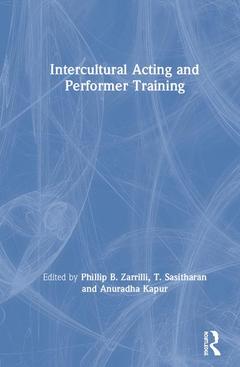Description
Intercultural Acting and Performer Training
Language: English
Keywords
Intercultural Theatre Practice; Embodied; Odin Teatret; Global; Putu Wijaya; Grotowski; Intercultural Theatre; Intracultural; Ohno Kazuo; Polycultural; Tai Chi; Singapore; Contemporary Actor Training; Stanislavski; Tatsumi Hijikata; Stanislavsky; Performer Training; Suzuki; Voice Training; Xiqu; Traditional Theatre Form; Michael Chekhov; Actor Training; Balinese Topeng; Cloud Gate; Jingju Actors; Lin Hwai Min; Traditional Jingju; RSC Actor; Male Martial Artist; Balinese Dance Drama; Balinese Performance; Roberta Carreri; Balinese Theatre; Balinese Performer
Publication date: 06-2019
· 15.6x23.4 cm · Hardback
Publication date: 06-2019
· 15.6x23.4 cm · Paperback
Description
/li>Contents
/li>Readership
/li>Biography
/li>
Intercultural Acting and Performer Training is the first collection of essays from a diverse, international group of authors and practitioners focusing on intercultural acting and voice practices worldwide. This unique book invites performers and teachers of acting and performance to explore, describe, and interrogate the complexities of intercultural acting and actor/performer training taking place in our twenty-first century, globalized world.
As global contexts become multi-, inter- and intra-cultural, assumptions about what acting "is" and what actor/performer training should be continue to be shaped by conventional modes, models, techniques and structures. This book examines how our understanding of interculturalism changes when we shift our focus from the obvious and highly visible aspects of production to the micro-level of training grounds, studios, and rehearsal rooms, where new forms of hybrid performance are emerging.
Ideal for students, scholars and practitioners, Intercultural Acting and Performer Training offers a series of accessible and highly readable essays which reflect on acting and training processes through the lens offered by "new" forms of intercultural thought and practice.
List of Figures
Introduction in three parts:
Part 1: Re-framing intercultural acting and actor training in the 21st century by Phillip Zarrilli
Part 2: Recalibrating intercultural acting/training today by Anuradha Kapur
Part 3: The "hot crucible" of Intercultural Actor Training: The Singaporean Context by T. Sasitharan
Chapter 1: Actor training at the Intercultural Theatre Institute of Singapore by Giorgia Ciampi Tsolaki
Chapter 2: From the flower to madness: the ontology of the actor in the work of SuzukiTadashi by Glenn Odom
Chapter 3: Dancing Hamlet in a world of frogs: butoh and the actor’s inner landscape by Tanya Calamoneri
Chapter 4: Stepping out of the frame: contemporary jingju actor training in Taiwan by JasmineYu-Hsing Chen
Chapter 5: Re-considering intercultural actor training in South Africa today: ‘borrowing on our own terms’ by David Peimer
Chapter 6: The actor’s process of negotiating difference and particularity in intercultural theatre practice by Sunhee Kim and Jeungsook Yoo
Chapter 7: The role of ‘presence’ in training actors’ voices by Tara McAllister-Viel
Chapter 8: Training a performer’s voices by Electa Behrens
Chapter 9: Grasping the bird’s tail: Inspirations and starting points by Christel Weiler
Chapter 10: Embodying Imagination:butoh and performer training. by Frances Barbe
Chapter 11: Arifin and Putu: Teater Modern acting in New Order Indonesia by Kathy Foley
Chapter 12: RENDRA 2.0: Cross-cultural theatre, the actor’s work and politics in dictatorial Indonesia by Marco Adda
Chapter 13: Bali in Brazil by Carmencita Palermo
Chapter 14: Traditional Opera in a ‘Modern’ Society: Institutional Change in Taiwanese xiqu Education by Tai Hsin-Hsin and Josh Stenberg
Index
Phillip Zarrilli is Artistic Director of The Llanarth Group and Emeritus Professor of Performance Practice at Exeter University, UK. Zarrilli is widely known for his publications on acting, including: Psychophysical Acting: an intercultural approach after Stanislavski (2009, 2010 Outstanding Book of the Year, ATHE); Acting (Re)Considered: Theories and Practices;and Acting: interdisciplinary and intercultural perspectives (co-author).
T. Sasitharan is Co-Founder and Director of the Intercultural Theatre Institute (ITI). He has worked as an actor, performer, director and producer and writes and lectures on art, theatre training, performance practice and Singapore culture. He received the Cultural Medallion, Singapore’s highest award for artists in 2012.
Anuradha Kapur is a theatre maker and presently Visiting Professor at Ambedkar University, Delhi. She is the author of Actors, Pilgrims, Kings and Gods: the Ramlila at Ramnagar, and her writings on performance have been widely anthologized. She completed her term as Director National School of Drama, New Delhi in 2013.
These books may interest you

A Korean Approach to Actor Training 209.69 €



